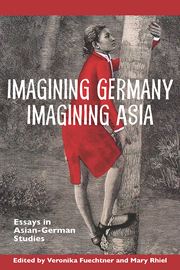Book contents
- Frontmatter
- Contents
- Acknowledgments
- Introduction
- Part I Contemporary Challenges to German Borders and Identities
- Part II Travel and Representation
- 5 Germany's India: A Critical Re-interrogation
- 6 Indians, Jews, and Sex: Magnus Hirschfeld and Indian Sexology
- 7 The Ambivalence of a Spiritual Quest in India: Waldemar Bonsels's Indienfahrt
- 8 Traveling through Imperialism: Representational Crisis and Resolution in Elisabeth von Heyking's and Alfons Paquet's Travel Writing on China
- 9 Measuring Asian-ness: Erwin Baelz's Anthropological Expeditions in Fin-de-Siècle Korea
- Part III Asia Inhabits Germany's Cultural and Intellectual History
- Bibliography
- Notes on the Contributors
- Index
6 - Indians, Jews, and Sex: Magnus Hirschfeld and Indian Sexology
from Part II - Travel and Representation
- Frontmatter
- Contents
- Acknowledgments
- Introduction
- Part I Contemporary Challenges to German Borders and Identities
- Part II Travel and Representation
- 5 Germany's India: A Critical Re-interrogation
- 6 Indians, Jews, and Sex: Magnus Hirschfeld and Indian Sexology
- 7 The Ambivalence of a Spiritual Quest in India: Waldemar Bonsels's Indienfahrt
- 8 Traveling through Imperialism: Representational Crisis and Resolution in Elisabeth von Heyking's and Alfons Paquet's Travel Writing on China
- 9 Measuring Asian-ness: Erwin Baelz's Anthropological Expeditions in Fin-de-Siècle Korea
- Part III Asia Inhabits Germany's Cultural and Intellectual History
- Bibliography
- Notes on the Contributors
- Index
Summary
The world tour of German-Jewish sexologist Magnus Hirschfeld stands in the midst of a series of fundamental transitions in the early 1930s: the transition between the world of Weimar Germany and the world of fascism and exile, the transition between the colonial and the postcolonial world, and the transition between sexology and eugenics as dominantly European-based new sciences to globalizing sciences that find their centers and protagonists in non-European societies. In this article I will focus on Hirschfeld's visit to India in 1931, where these transitions play out most visibly. Using Hirschfeld's own account of his world travel, the contemporary Indian press coverage, and other archival materials, I argue that Hirschfeld's account of Indian sexology presents a complicated reaction against the rise of fascism and an implicit rejection of fascist ideas of race and eugenics on the eve of Hirschfeld's exile from Germany. I also explore Hirschfeld's identification with the Indian independence movement and the connection he draws between his liberal-humanist view of sexual autonomy and the anti-colonial fight for political autonomy. In his encounter with India, Hirschfeld also reconceptualizes the science of sexology and his own role within it in complicated and at times contradictory ways. while Hirschfeld presents himself as a “sage from the West” and largely does not engage the main proponents of contemporary Indian sexology, he posits India as the birthplace of sexology and the Kamasutra as its original text.
- Type
- Chapter
- Information
- Imagining Germany Imagining AsiaEssays in Asian-German Studies, pp. 111 - 130Publisher: Boydell & BrewerPrint publication year: 2013

